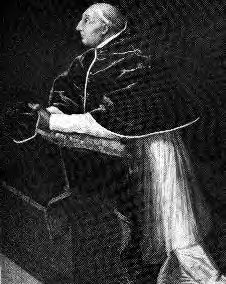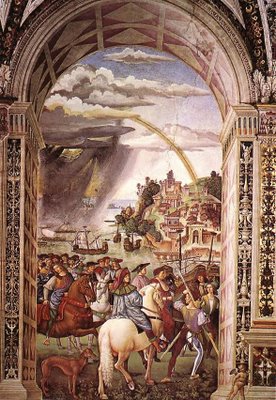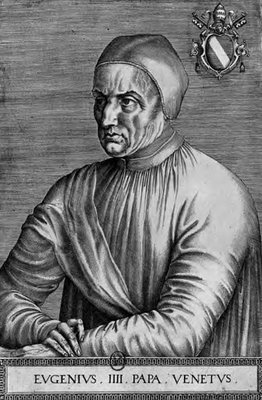 Martin V
Martin VPope Martin V convoked the Council in 1431. The last session when it was closed in 1449 was at Lausanne.
In a detailed and lengthy article in The Catholic Encyclopaedia, James MacCaffrey set out the long history of the Council, with all its twists and turns. It is set out at http://www.newadvent.org/cathen/02334b.htm.
In a detailed and lengthy article in The Catholic Encyclopaedia, James MacCaffrey set out the long history of the Council, with all its twists and turns. It is set out at http://www.newadvent.org/cathen/02334b.htm.
A long account of the Council (based on the Commentaries of Pius and other sources) is given in the 1583 edition of The Book of Martyrs by John Foxe. See http://www.hrionline.ac.uk/foxe/single/book6/6_1583_0668.html
The underlying issue was: who governed the Church: the Pope or the Council ? Which body had final jurisdiction ?
The principal purpose of the Council was to be the reformation of the Church in its "head and members," the settlement of the Hussite wars, the establishment of peace among the nations of Europe, and finally the reunion of the Western and Eastern Churches.
However, first Pope Martin V and then his successor, Pope Eugene IV, were overruled by the Council as the Council asserted itself against the papal power. Indeed, at one point, the Council elected Felix V as pope (or anti-pope). As time went on, and as the debates and events developed, the various parties changed "sides". Aeneas (the future Pius II) was not the only one who opposed the Papal power whilst at the Council and then changed his position at a later date.
 Pintirricchio- The Piccolomini Library in The Duomo at Siena:
Pintirricchio- The Piccolomini Library in The Duomo at Siena:Aeneas attends the Council of Basle

The other members of the council who took a prominent part in the proceedings were Capranica who had been appointed cardinal by Martin, but who as his appointment had not been published was not admitted to the conclave on the death of Martin nor recognized by Eugene; the renowned scholar Nicholas of Cusa; Cardinal Louis d'Allemand; John of Antioch; John of Ragusa, and the two canonists, Nicholas, Archbishop of Palermo, and Louis Pontanus.
The Council asserted its independent jurisdiction. It refused to accept Eugene IV`s command that it transfer to Ferrara. The Council remained at Basle. Most of the Christian States stood loyal to the pope and to the Council of Ferrara. England, Castile and Aragon, Milan, and Bavaria disavowed the assembly at Basle. But France and Germany, though recognizing Eugene IV, endeavoured to maintain a neutral position.
In a meeting of the French Clergy at Bourges (May, 1438), at which were present delegates from the Pope and from Basle, it was determined to remain loyal to Eugene, while at the same time many of the reforms of Basle were accepted with certain modifications. It was on this basis that the twenty-three articles of the Pragmatic Sanction of Bourges were drawn up (7 July, 1438). In Germany, after the death of Sigismund (9 December, 1437), delegates of both parties attended at Frankfurt (1438) to seek the assistance of the princes. But the princes declared for neutrality until a king had been elected. Even after the election of Albrecht II, the attitude of neutrality was maintained till at last, in Mainz (March, 1439), they followed the example of France and declared for Eugene IV as lawful pope while they accepted many of the reforms of Basle.
After some sort of accomodation was reached between the Council and Eugene IV, the Hussite controversy was sorted between 1433 and 1437.
However, as MacCaffrey points out, much energy and time were wasted in dealing with the issue of jurisdiction rather than reform of the Church.
It opened the door for the secular rulers to undertake what the ecclesiastical authorities had failed to set right. It reduced the authority of the papacy. It led directly in France, through the Pragmatic Sanction of Bourges, to the establishment of Gallicanism as a definite formula. In Germany, through the long intervals of neutrality, people were prepared for the complete severance from the Papacy which was afterwards effected in the Reformation.

Pope Eugene IV
D'après Jean Fouquet Paris, BnF, Réserve des livres rares, Rés. H 81 (Gravure n° 8 du recueil d'Onofrio Panvinio, Onuphrii Panvinii Veronensis Fratris Eremitæ Augustiniani XXVII Pontificum maximorum Elogia et imagines accuratissime ad vivum æneis typis delineatæ, Rome, 1568)
Notes:
(1) Blessed Louis Cardinal Allemand
Cardinal Archbishop of Arles, whose name has been written in a great variety of ways (Alamanus, Alemanus, Almannus, Alamandus, etc.), was born at Arbent in the Diocese of Belley in 1380 or 1381; d. 16 September, 1450.
Cardinal Archbishop of Arles, whose name has been written in a great variety of ways (Alamanus, Alemanus, Almannus, Alamandus, etc.), was born at Arbent in the Diocese of Belley in 1380 or 1381; d. 16 September, 1450.
Through the influence of a relative, François de Conzié, who was papal chamberlain, Allemand soon became prominent in the ecclesiastical world. He was named Bishop of Maguelonne in 1418 by Martin V who entrusted him with important missions, regarding for example the transference from Pavia to Siena of the Council which was convoked in 1423.
In December, 1423, he was made Archbishop of Arles and in 1426 Cardinal.
Later on and especially after 1436 he began to play a most important part in the Council of Basle, where he made himself the head of the party which maintained the supremacy of the council over the pope (a doctrine already much ventilated at the Council of Constance where Allemand had been present), and which eventually proceeded to the deposition of Eugenius IV.
In 1439 Allemand was primarily responsible for the election of Felix V, the antipope, and it was Allemand who, sometime later, consecrated him bishop and crowned him as supreme pontiff.
During the continuance of the assembly at Basle, he showed heroic courage in tending the plague-stricken.
In the years which followed Allemand discharged several diplomatic missions in behalf of Felix V, while he openly disregarded the decrees of Eugenius IV, which pronounced him "excommunicated" and deprived him of his dignity as cardinal.
After the resignation of Felix V, brought about by the assembly of bishops which met at Lyons in 1449, Allemand was reinstated in his dignities by Nicholas V.
His violent action at Basle seems to have resulted from an earnest desire for the reform of the Church, and having made his submission to Nicholas V, he is believed to have done penance for his former disloyal and schismatical conduct.
He died shortly after in the odour of sanctity. His private life had always been a penitential one, and many miracles were reported to have been worked at his tomb.
In 1527 a Brief of Clement VII permitted him to be venerated as Blessed.
Article in The Catholic Encyclopaedia. See http://www.newadvent.org/cathen/09376a.htm.
(2) Pope Eugenius IV
Pope Eugene IV (1383 – February 23, 1447), born Gabriele Condulmer, was Pope from March 3, 1431 to his death.
He was born in Venice to a rich merchant family, a Correr on his mother's side. Condulmer entered the Augustinian order at the monastery of St. George in his native city.
At the age of twenty-four he was appointed by his uncle Pope Gregory XII (1406–15), as Bishop of Siena, and came into prominence. In Siena, the political class objected to a 24-year old bishop who was a foreigner. So the issue was not pressed and he resigned the appointment, becoming instead his uncle's papal treasurer, protonotary, Cardinal Priest of St Marco and St Clemente, and later Cardinal Priest of Basilica di Santa Maria in Trastevere.
He made himself useful to Pope Martin V (1417–31) and was quickly elected to succeed him, and was crowned as Eugene IV at St. Peter's, March 11, 1431. By a written agreement made before his election he agreed with the cardinals to distribute to them one-half of all the revenues of the Church and promised to consult with them on all questions of importance, both spiritual and temporal.
Upon taking the Papal Chair, Eugene IV's violent measures against the numerous Colonna relations of his predecessor, Pope Martin V (Otto di Colonna), who had rewarded his numerous clan with castles and lands, at once involved him in a serious contest with the powerful house of Colonna that nominally supported the local rights of Rome against the interests of the Papacy. A truce was soon arranged.
But by far the most important feature of Eugene IV's pontificate was the great struggle between the Pope and the Council of Basel, also referred to as the Council of Florence, (1431–39), part of the historic Conciliar movement.
On July 23, 1431, his legate, Ambrogio Traversari, opened the council, which had been convoked by Martin V, but, distrustful of its purposes and emboldened by the small attendance, the Pope issued a bull on December 18, 1431, dissolving the council and calling a new one to meet in eighteen months at Bologna. The council resisted this premature expression of papal prerogative, as it appeared to the majority of them that Eugene IV's action gave some weight to the contention that the Curia was opposed to any authentic measures of reform. The council refused to dissolve; instead they renewed the revolutionary resolutions by which the Council of Constance had declared a council superior to the Pope, and cited Eugene IV to appear at Basel. A compromise was arranged by Sigismund, Holy Roman Emperor, who had been crowned emperor at Rome on May 31, 1433. By its terms the Pope recalled his bull of dissolution, and, reserving all the rights of the Holy See, acknowledged the council as ecumenical (December 15, 1433).
The establishment of an insurrectionary republic at Rome drove him into exile in May 1434. Disguised in the robes of a monk, he was rowed down the center of the Tiber, pelted by stones from either bank, to a Florentine vessel waiting to pick him up at Ostia. Although the city was restored to obedience by Giovanni Vitelleschi, the militant Bishop of Recanati, in the following October, the Pope remained at Florence and Bologna.
Meanwhile the struggle with the council sitting at Basel broke out anew. Eugene IV at length convened a rival council at Ferrara on January 8, 1438, and excommunicated the prelates assembled at Basel. The result was that the Council of Basel suspended him on January 24, 1438, then formally deposed him as a heretic on June 25, 1439, and in the following November elected the ambitious Amadeus VIII, Duke of Savoy (1416–40), antipope under the title of Felix V (1439–49).
The conduct of France and Germany seemed to warrant this action, for Charles VII of France (1422–61) had introduced the decrees of the council of Basel, with slight changes, into France through the Pragmatic Sanction of Bourges (July 7, 1438), and the Diet of Mainz had deprived the Pope of most of his rights in the Empire (March 26, 1439).
At Florence, where the council of Ferrara had been transferred on account of an outbreak of the plague, was effected in July 1439 a union with the Eastern Orthodox Church, which, as the result of political necessities, proved but a temporary bolster to the papacy's prestige.
This union was followed by others of even less stability. Eugene IV signed an agreement with the Armenians on November 22, 1439, and with a part of the Jacobites in 1443, and in 1445 he received the Nestorians and Maronites. He did his best to stem the Turkish advance, pledging one-fifth of the papal income to the crusade which set out in 1443, but which met with overwhelming defeat.
His rival, Felix V, meanwhile, obtained small recognition, and the latter's ablest adviser, the humanist Aeneas Sylvius Piccolomini, who was later to be Pope Pius II (1458–64), made peace with Eugene IV in 1442.
The Pope's recognition of the claims to Naples of King Alfonso V of Aragon (1416–58) withdrew the last important support from the divided council of Basel, and enabled Eugene IV to make a victorious entry into Rome on the 28th of September 1443, after an exile of nearly ten years.
His protests against the Pragmatic Sanction of Bourges were ineffectual, but by means of the Concordat of the Princes, negotiated by Piccolomini with the electors in February 1447, the whole of Germany declared against the antipope.
Although his pontificate had been so stormy and unhappy that he is said to have regretted on his deathbed that he ever left his monastery, nevertheless Eugene IV's victory over the council of Basel and his efforts on behalf of church unity contributed greatly to break down the conciliar movement and restore the papacy to the dominant position it had held before the Western Schism (1378–1417).
Eugene IV was dignified in demeanour, but inexperienced and vacillating in action and excitable in temper. Bitter in his hatred of heresy, he nevertheless displayed great kindness to the poor. He laboured to reform
the monastic orders, especially the Franciscan, and was never guilty of nepotism. Although austere in his private life, he was a sincere friend of art and learning, and in 1431 he re-established the university at Rome.Article from The Catholic Encyclopaedia. See also http://en.wikipedia.org/wiki/Pope_Eugene_IV
